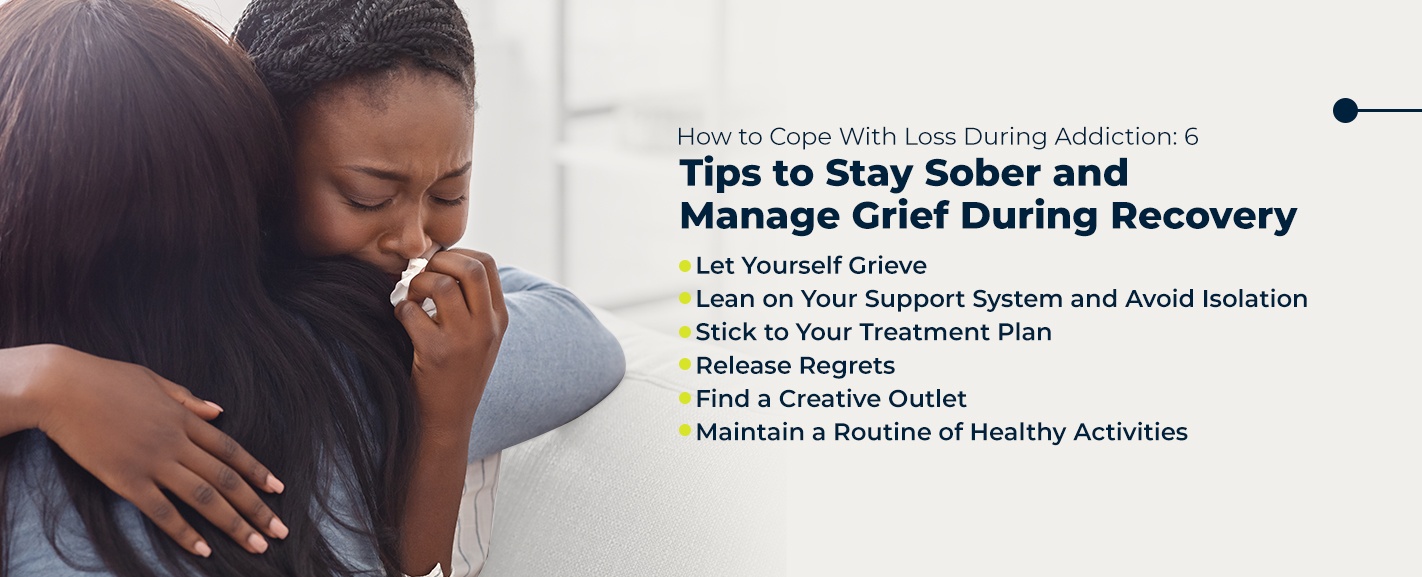- Aug 30
- Drug Addiction Treatment
Grief is a complicated, formidable force. The death of a partner, pet, friend or family member can leave you reeling with unanswered questions and feelings of guilt. It hurts to lose someone you care about, even if the relationship had its challenges, and the subsequent physical and emotional distress from that loss is overwhelming.
If you are grieving the death of a loved one while going through recovery, you are in the midst of one of life’s most difficult experiences. While you may have previously coped with stressors using substance use, you are now sober — and you are struggling to resist temptations as you mourn. If you feel like this is the hardest time you’ve endured avoiding relapse, take comfort in knowing that you are not alone.
Understand how grief affects your recovery and what steps you can take to stay sober during this difficult time.
- How Grief Affects Addiction Treatment and Recovery
- Recognize and Understand Your Vulnerability in Grief
- How to Cope With Loss During Addiction: 6 Tips …
- Find Compassionate Addiction Treatment at Gateway Foundation
How Grief Affects Addiction Treatment and Recovery
In the aftermath of a profound loss, grief can stir up addiction triggers — emotions and memories that lead to an impulse to use a substance again. Triggers do not necessarily result in relapse, yet they make it more difficult to resist the urge to use drugs or alcohol. A study examining the relationship between alcohol use and bereavement found that men bereaved for two years are two times more likely to have an alcohol use disorder than men who are not experiencing grief.
People suffering from complicated grief — a form of grief that does not improve even with time, affecting at least 7% of bereaved people — are especially vulnerable to developing an addiction or relapsing as they attempt to cope. Because triggers more intensely affect people experiencing a loved one’s death, it is vital to maintain your recovery plan and utilize coping skills learned through therapy at this time.
Recognize and Understand Your Vulnerability in Grief
The unexpected pain of grief can derail an otherwise stable recovery plan. Experiencing a sudden loss during addiction can create a high-risk situation for a person recovering from substance use, even for someone who has been sober for years.
When faced with a painful situation, the first crucial recovery step is to recognize that you are in a state of vulnerability and ask for support. Members of your support system are likely mourning the same loss themselves, but you should still reach out to them.
Community is a safety net during grief, so let it catch you when you need it. Catch others when you are able. Surround yourself with the presence of people who care about you and support your sobriety journey to give you the strength you need while you mourn.
Processing death during recovery is a challenge. But remember that the intensity of these emotions will lessen with time, and equipping yourself to manage your recovery during the strongest waves of sorrow is possible and maintainable.
How to Cope With Loss During Addiction: 6 Tips to Stay Sober and Manage Grief During Recovery
Staying sober in times of trouble is a challenge, but with the right tools, it can be done. Consider these tips for coping with loss during addiction:
1. Let Yourself Grieve
The first step to grief management is to acknowledge it. When you try to bottle up feelings of loss, anger and sadness, that suppression only delays and lengthens your grieving process. Pushing away your mind and body’s normal response to loss can take you down a dangerous road toward unhealthy coping mechanisms like the use of drugs or alcohol.
To stay sober in grief, you must accept and embrace the fact that you are indeed grieving. Full acknowledgment of your loss allows you to journey through the stages of grief without succumbing to destructive behavior.
2. Lean on Your Support System and Avoid Isolation
Isolation is a common desire for many people during grief. While you may yearn to process loss alone, cutting yourself off from your network is more likely to lead to relapse. It’s OK to cry and show others how you feel — reach out to your sober friends and loved ones who support your sobriety. If you prefer to grieve more privately, communicate with your treatment plan medical professionals and connect with a bereavement counselor.
If you feel stressed with legal, funeral and other arrangements, ask your network to help. Lean on others to assist with legal matters, sort or remove the loved one’s possessions and any other responsibilities during this time.
3. Stick to Your Treatment Plan
As laborious as it may feel after experiencing a loss, stick to the steps and management strategies set forth by your treatment program. Maintain regular contact with your sobriety network, therapist and medical team. Talk to your sponsor about what you are experiencing.
Continue all of your treatment routines — go to your addiction support and therapy meetings, and if needed, increase the frequency of attendance. Now more than ever, it’s essential to surround yourself with people who truly understand your struggles.
4. Release Regrets
When we experience the sudden loss of someone we care about, we may feel overcome with guilt. Thoughts of all the things we wanted to say flood in, and the weight of missed experiences can be immense. This feeling of regret is familiar for those who mourn, and it can be more difficult for individuals who suffer from drug and alcohol addiction.
Instead of allowing the cloud of regret to turn into a dangerous inner storm that could trigger a relapse, permit yourself to let it go. Let go of any blame, forgive yourself and remember all the positive life lessons you learned during your relationship with the deceased.
5. Find a Creative Outlet
Music, art and other creative outlets are healing tools to process loss. Grief counselors use visual art and creative therapies as an effective psychotherapeutic approach to grief treatment. These forms of expression transcend spoken communication, helping the bereaved examine complex feelings and thoughts that are difficult to verbalize.
Whether you play a musical instrument, scrapbook, paint or illustrate thoughts in a journal, find an outlet of creativity that resonates with you. Engaging in the arts can ground you as you process your emotions.
6. Maintain a Routine of Healthy Activities
In deep grief, sometimes people forget to maintain basic care like brushing teeth, taking showers, staying hydrated, eating and taking medicine. Discuss your medical plan with your doctor to make sure you continue proper treatment during bereavement. Set reminders or ask a trusted friend to check in with you to make sure you continue to take medicine and eat regularly scheduled meals.
While studies have shown that exercise can ease symptoms of depression, grief and depression are different experiences. Grief takes an immense emotional and physical toll on your body. If you followed a strict exercise program or diet before your loss, easing back from strenuous workouts may be the smart choice. Consider yoga or walking in lieu of intense workouts. Listen to your body — if it needs to rest, let it.
Find Compassionate Addiction Treatment at Gateway Foundation
If you or a loved one is experiencing difficulty maintaining sobriety during a time of loss and grief, the qualified experts at Gateway Foundation are here to help. Gateway Foundation uses evidence-based practices to provide our patients with the tools they need to identify and minimize triggers during every step of their substance use recovery, including:
- Medically supervised withdrawal management
- Group and individual therapy
- Psychiatric and medical care
- Support groups
- Art therapy
- Specialized therapeutic techniques
With more than 50 years of experience providing patients with comprehensive, compassionate care, our trusted team is ready to provide alcohol and drug addiction treatment plans personalized to your needs.
If you’re ready to take this critical step to start a recovery journey or reinforce ongoing recovery, call Gateway Foundation at 877.381.6538 or contact us online today.




